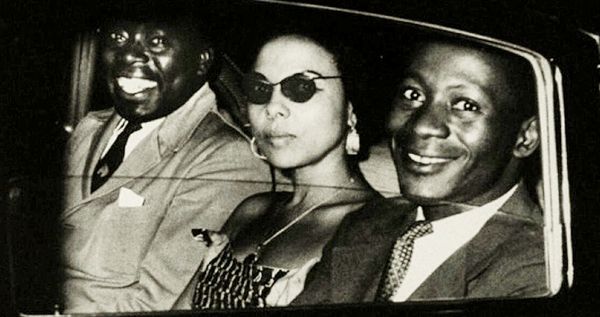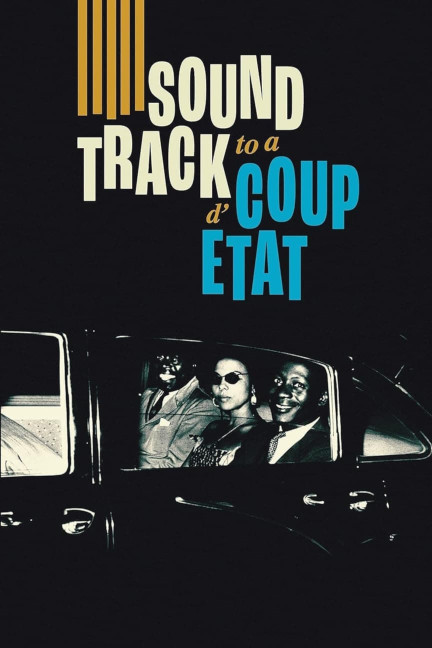Eye For Film >> Movies >> Soundtrack To A Coup d'Etat (2024) Film Review
Soundtrack To A Coup d'Etat
Reviewed by: Jennie Kermode

Where does one locate the nexus of historic political change? For some documentarians, it is in the big name events: the signing of treaties, the firing of bullets. For others it is in the births, deaths and marriages of those accorded great (men). Johan Grimonprez has never been inclined to see the world in such simplistic terms.
For him, it’s all about the development of ideas, of new modes of consciousness, taking form in disorderly and non-linear ways before rapidly acquiring cultural force, do that to those who were not keeping up they seem to come from nowhere. A lot of happens in the course of this documentary, but there’s a reason why he centres it on the response to the assassination of Patrice Lumumba: Abbey Lincoln, Max Roach and Maya Angelou storming into the United Nations to the shock and outrage of its delegates. Minor those the incident might seem in the grand scheme of things, this was a moment in which rising Black consciousness, feminist consciousness and Africanism came together to disrupt the white equilibrium, destroying forever the belief that a hierarchy of humanity could be maintained through simple intimidation and assumed consent.
This incident bookends the film. The rest, in patchwork form, tells us how we got there, with intermittent excursions into the present in the form of brightly coloured adverts which reminded us that the struggle is ongoing, the demand for African rare earth minerals as fierce as ever. The Congo is the key to Africa, it’s said, and Katanga is the key to the Congo. American and European plans evolve accordingly, as they do in other parts of the continent. Popular uprisings are crushed or subverted but, it is implied, the idea of rising up is harder to kill. In the US, the nascent jazz movement engages with the struggle, and sometimes those in power find ways to exploit this too, but elsewhere the music gets into people’s hearts, giving them courage, enabling them to become proud of who they are.
“We do use the music as a weapon – against man’s inhumanity toward man,” says Max Roach.
The atomic arms race comes into play. Everybody wants Katanga’s uranium. Africa as a whole finds itself on the front line, the location for proxy wars as the US strives to hold off the threat of Communism, even if it sometimes needs to prop up that threat to keep the whole thing going. individual US soldiers and secret agents share their thoughts, some buying into this, some interested mainly in the money. Asked how it felt the first time he killed a man, one remembers being struck by the finality of it – but after a while, he says, there was so much killing that he found himself becoming callous. Meanwhile, in the Shinkolobwe mine, abducted, enslaved people were forced to extract the radioactive ore which would be used to destroy Hiroshima and Nagasaki.
Among the many great jazz artists featured here, it is perhaps Nina Simone whom we hear from most, always able to capture that darkness with her voice, powerful and controlled and not willing to hide her bitterness for white people’s sake. It is a necessary bitterness here, a call for justice, something growing over time even as victory after victory seems to fall to those who oppose that. Simone’s presence also underlines the film’s focus on female empowerment as a key constituent of successful nationhood and, beyond that, of building a movement strong enough to stand up to the entrenched tyranny of white men.
That tyranny is presented here with a full acknowledgement of its cruelty, but care is taken not to be gratuitous, not to further exploit suffering; and beyond this, Grimonprez is keen to highlight its ridiculous side, from the wild theorising used to justify certain actions to practical (but potentially lethal) absurdities like the Fidel Casto exploding cigar plot. He also makes room for the more consciously outré moves of people on the other side, such as Dizzy Gillespie’s run for president and plan to rename the White House the Blues House.
“The ballot is as powerful as the bullet,” says Malcolm X, enthused by the growing power of African voting blocks. it’s tragic because we know what will be done to him, both reputationally and physically; and we know what will be done to them, how many will be bought out and poisoned and corrupted; yet something emerges from all this, and it’s there in the music and in Lincoln, Roach and Angelou’s action. Something has changed and will never go back. At a dark time in politics, Grimonprez invites us to look back at all of the powers ranged against international Black emancipation and see people who did it anyway, and remember that, though the struggle is ongoing, progress is real. Also, it’s the good guys who have all the best music.
Reviewed on: 16 Nov 2024















